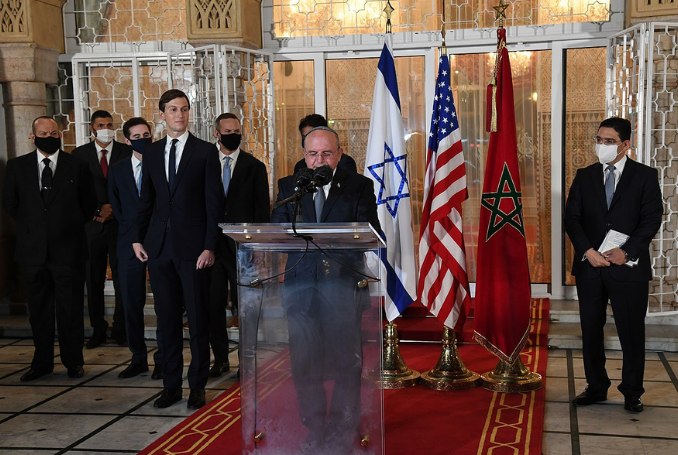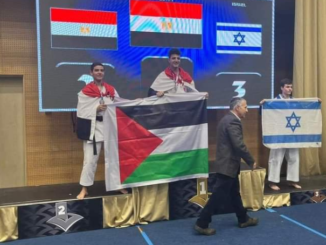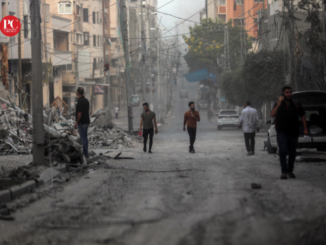
This critical essay deconstructs the political narrative surrounding the naturalization agreements that have occurred between some Arab countries and Israel formally known as the Abrahamic Accords or Jared Kushner’s plan for peace in the Middle East. It offers unique perspectives and analysis of these accords and their true geopolitical intentions. Primarily, it argues how the peace promised by these newly established ties remains just a myth as it explores the true objectives behind them. Interestingly enough, it also highlights the true goals behind the U.S’ mediations in these Accords.
The Palestinian-Israeli conflict is one of the hottest yet unresolved political issues of today. Whereas this conflict is not heading towards any resolutions soon, the recent naturalization agreements that have occurred between some Arab regimes and the apartheid state of Israel may mark a future shift in Middle East’s political scene.
Earlier to these agreements, boycotting Israel was these Arab nations’ approach to show support for Palestinians and their claims. Before 2020, only two bordering countries have had diplomatic ties with Israel; that is, Egypt and Jordan. This number has risen to six as the United Arab Emirates (UAE), Bahrain, Sudan and Morocco have set full diplomatic and economic relations with Israel as part of Jared Kushner’s plan for peace in the Middle East known formally as the Abrahamic Accords.
Celebrating the first occurrence of the Abrahamic Accords, Trump hosted a signing ceremony in the White House and had the following rash statement to announce: “We’re here this afternoon to change the course of history. After decades of division and conflict, we mark the dawn of a new Middle East.” By this politically immature statement, Trump seemed as if he had finally found a solution to the conflict in the region.
As for peace in the region is concerned, Jared Kushner’s peace plans do not make any sense. Apart from Sudan, none of the countries involved with these accords are in conflict with Israel. On the opposite, Morocco and so the Gulf States have retained very healthy diplomatic relations with Israel, even if they were undeclared publicly. For instance, Morocco has had a fair share of intelligence-sharing with Israel since the mid-sixties. On top of that, the two countries had liaison offices in Tel Aviv and Rabat from Sept. 1, 1994, to Oct. 23, 2000. Not to mention Morocco’s contribution in populating Israel by handing over its Jewish population to the newly established Jewish state during the reign of the Moroccan king Hassan II.
Granted, Israel supports the totalitarian regimes of the region mainly because these totalitarianisms do not demand accountability for its human rights and international law violations. Hence, most Arab dictatorships have been dealing with Israel on political and security levels; especially after the outbreak of the Arab spring where these regimes had to obtain the latest spying and security tech to topple every dissident in their population who desires regime change. Whereas the case of the Washington Post’s correspondent Jamal Khashoggi remains the most covered case, Amnesty International has reported that Moroccan journalist Omar Radi’s phone has also been infected with the Israeli Pegasus spyware.
The Myth of Peace: Deception, Expansion and Dispossession.
Each time an Arab country initiates full diplomatic relations with Israel, its local propaganda machine makes it look as a major historical event that has occurred in the country. Some media outlets have gone far with this. For example, they take the religious tolerance preached in the Muslim faith as a pretext for setting these normalization agreements with this ‘Jewish’ nation. Other media platforms, however, have beautified the image of Israel’s apartheid regime via elaborate historical descriptions of Jewish culture and heritage. This is not wrong at all, but what is wrong is to evoke this history only at this particular event ignoring Israel’s present violations of International Law and Human rights and most of all occupation of Palestinian lands. This is why it is easy to deconstruct the naturalization narrative and prove that it is just a myth.
First of all, the context of these agreements was preceded and controlled by the 2020 US elections. Trump’s administration had tried to convince the American public that it will be the first administration that ends the conflict in the Middle East and thus planning on gaining a potential leverage in the election race. But despite the occurrence of the Abrahamic Accords last year and even Trump’s administration’s decision to recognize Jerusalem as Israel’s capital on December 6, 2017, it still was not enough to win Trump the approval of the devastated American public. This is mainly because Americans wanted Trump out of the White House at any cost; even if it meant choosing the lesser evil of the two candidates in the elections.
Meanwhile, these events come as a perfect opportunity to boost the reputation of the Likud party and more specifically the reputation of Israel’s Prime Minister Benjamin Netanyahu whose image has been stained by his corruption and monopoly of the Israeli political scene. Unlike Trump, the chances of him getting replaced in the upcoming Israeli elections are relatively low because of his firm grip on power and the lack of his equal in the Israeli political arena. Furthermore, with the massive press coverage that comes with such events, Netanyahu, similarly to Trump, wanted the spotlights on him to distract the public from his administration’s terrible handling of Covid-19 and thus gaining significant leverage in the elections.
Second, the biggest gain for Israel from these new ties with the Arab States and Morocco is that it reinforces its political influence in the Middle East. Not only this, but unlocking Israel’s geo-political isolation in the region as well. And since this newly granted influence to Israel is an approved one, it gives it freedom to expand and occupy more without any opposition. Of course, if Israel is gaining a legitimate influence in the region, this means that Palestine’s position will exacerbate. And thus the Palestinian cause will no longer have the leverage it has on the Middle Eastern political scene.
Furthermore, Israel’s decision to create ties with the Gulf countries in specific is not arbitrary. This move was motivated by economic reasons. As it is known, the Khaleeji people are the biggest consumers in the region. Hence the khaleeji market becomes a perfect destination for Israeli goods. Israeli products, foods in specific, can even replace other products coming from other countries because of the close distance and the low shipping costs. Additionally, Sudan may not offer much as markets are concerned, but it is definitely a great source of agricultural imports for Israel. Being the mediator between Israel and its “new” allies, the US benefits from these agreements as well since it is Israel’s biggest ally. After all, any ongoing political conflict between Israel and any of the Middle Eastern countries is primarily endangering US’ political and economic interests in the region. In other words, the mediation of the US in these so-called Peace agreements is not out of a sort of altruism because the US is only after its share of the pie.
Third, to say that these newly established ties will bring “peace” to the region is ludicrous and rash but not totally wrong. But for whom this peace is served; for Palestine, for the Arab States, or for Israel? To give a rather simple and short answer, it is apt to say it remains just a myth for the Palestinians in specific, but it means more security and power for the Israeli side in particular. To put it differently, with Israel having full diplomatic ties with these Arab countries and Morocco, it becomes easy for it to carry its annexation plans and dispossession of Palestinian lands without being held accountable. And the Palestinians are likely to be displaced gradually and implicitly to one of these countries. Apparently, Morocco and the rich Gulf states are the biggest fish that Israel could ever come to terms with. Since they provide financial comfort and political stability, some Palestinians may choose these destinations over their currently Israeli-occupied and war-inflected homes.
However, it is worth mentioning that the Emiratis as well as the Saudis despise the Palestinians. Hence, the Palestinians will never accept the reality of being displaced to one of these two countries. Meanwhile, this does not apply to either Kuwait or Oman in which do not have a strong political influence in the region. Apart from Morocco, they maybe the desired destination Israel is looking for to displace the Palestinians to after annexing their lands. Whether the two countries agree to normalize relations with Israel in the future or not, it does not really matter as long they are subservient to UAE and Saudi Arabia. Apparently, the Palestinians are likely to resist as they usually do.
Concurrently, Israel is likely to pressure them to accept this bitter reality as it has been doing for the last decades. Hence, Israel will possibly seek not only to increase its siege and pressure on the borders and checkpoints, but it may also instigate a war with Hamas as a pretext for a military escalation. Hamas, on the other hand, will be, as always, scapegoated for the whole thing especially that it is classified as a terrorist organization. Therefore, the peace that Israel is seeking is a peace with the Palestinians out of Palestine.
However, Israel is not the only benefactor from these agreements. Clearly, the Gulf States have paid for US military protection by signing these accords. But UAE in specific have had further arms deals and gained even more political protection against the Iranian influence in the Arab peninsula. Nonetheless, when a country signs a peace deal, it does not instantly demand acquirement of advanced F-35 stealth Jet, which is what this Gulf State did, because the two are paradoxical. Therefore, in opposition to the classic definitions of peace treaties, the brokered peace from these agreements is a purchased one like many peace agreements that have been signed before it in the region. After all, Sudan agreed to normalize relations with Israel so it is de-listed from the state-sponsors of terror, the Gulf States signed them as a payment for US military protection and Morocco got support for its sovereignty over Western Sahara.
Therefore, as all the purchased peace agreements the Middle East has witnessed over modern history- whether it is peace for land, peace in exchange of monopoly or what have you- this one is also doomed to be broken by conflict since it is not based on a balanced compromise where two equal parties meet in the middle. Rather, it is a political move towards accumulation of power where the main side of this conflict, meaning the Palestinians, is not even included in these agreements.
The US, Morocco, and Israel: A Geopolitical Chess Game over Africa
The fact that Israel has pursued diplomatic relations with Morocco- a country so far away from the Middle East’s political discourse- is by no means for peace as it is claimed by any of the Accords’ orchestrators. The moment it was announced that Morocco was to resume relations with Israel, Moroccan propaganda machines overshadowed the controversies that come with this event by preaching to the public about the Moroccan Jewish heritage and the coexistence of the Abrahamic religions in this homogeneous sphere. This normalization was depicted as a win-win situation for Morocco especially that Trump has rewarded Morocco’s approval of its resumption of relations with the apartheid regime by signing a presidential proclamation that recognizes Morocco’s sovereignty over Western Sahara.
The celebrations following this recognition covered up totally for the naturalization. This proclamation has even become an independent narrative of its own. The official discourse in Moroccan media has asserted that this recognition is the fruit of long-lasting diplomatic ties between Morocco and the US and not as a part of the Abrahamic Accords. Moreover, many factors influence politics, but altruism is not one of them. Taking the fact that Morocco was the first country to recognize the independence of the US in 1777, and the two countries long diplomatic relations, it stands as a surprise that it took so much time for the US to recognize Morocco’s sovereignty over Western Sahara or at least support its claim diplomatically.
Meanwhile, political terminology is important here because Moroccan media had it intentionally mixed up to alleviate the Moroccan public’s rage. Trump’s presidential proclamation does not recognize the Western Sahara region as a Moroccan entity as they have claimed, but it only recognizes Moroccan sovereignty over it. These are two different things, because Morocco has already been practicing sovereignty over the region although with some difficulties mainly caused by intense altercations with the Algerian-backed Polisario Front. The only thing that Morocco has needed is legitimacy and this proclamation happens to be it. Obviously, this is a simple treat from the US for Morocco’s acceptance of the resumption of relations with Israel.
Nevertheless, the majority of the Moroccan public welcomed Trump’s move, but they abhorred Morocco’s establishment of ties with Israel. Nasser Bourita, the Moroccan Minister of Foreign Affairs, has refused to call this an act of “naturalization” of relations. For him, normalization is a Middle Eastern term that does not apply to Morocco which is not a neighboring country to Israel. Indeed, Morocco’s North African location and its large indigenous Amazigh population make it hard to proclaim the country as purely Arab.
Bourita has preferred using the term “resumption” of relations instead. As mentioned earlier, Morocco and Israel had Liaison offices in Tel Aviv and Rabat before Morocco had to close their office in response to Israeli repression of the second Palestinian Intifada in 2000. Not to mention, there is a number of almost 800.000 Jews of Moroccan decent living in Israel right now.
Obviously, Israel remains the biggest benefactor from these naturalization agreements. However, the US did not take part in them without purpose. The existence of Israel in the Middle East protects American interests in the region. That is why Zionist lobbies in the US always do their best to empower this regime. And this is what AIPAC is doing and what Christians United for Israel and other Zionist lobbies are doing. As a result, this support for the apartheid regime enables the US to retain its firm grip on Middle East’s political and economic affairs. These are all facts now. But the case of Morocco is still a uniquely dubious one. Pressing Morocco – a country so far away from The Middle East’s frenzy and even terminology to sign these deals seems confusing to say the least; especially that Morocco is not a rich country like the Gulf States.
However, ever since Morocco’s rejoining the African Union in 2017, many countries and the US particularly have started to look for ways to intensify their relations with this African country more than before. To illustrate, Morocco’s main weapon supplies come from the US. Granted, the influence of the US embassy in Rabat has surpassed diplomatic lines to influencing Moroccan cultural context and even influencing Moroccan academia via its grants and many programs and English learning courses. This soft pressure changes the structure of Moroccan society with time. As of now, although French is the official second language in Morocco, the majority of Moroccan youth, many of whom have benefited from US grants and programs, speak English. This is not bad at all, but again, politics is the game of interests and not altruisms. Implemented in these courses and grants are soft ideologies that create sympathy and acceptance of US values and democracy in the Moroccan community. In the long run, acceptance of the US image rises even if its intentions in the region are not necessarily benevolent.
To connect this to the question at hand, Morocco remains the US’ key holder to the African Union and African countries. This strategic move to invest in Morocco politically and economically and then support its sovereignty over its full territorial land comes as the price for infiltrating a fertile network of rising African economies. Hence, these countries become perfect investment destinations for the US. And although China is the biggest player in Africa as economy is involved, not counting the previous colonial powers of Africa, the US is doing the best it can to take this role in the near future. After its degrading failure to do so under pretexts of humanitarian aid and war on terror, the UShas finally chosen this diplomatic direction to overtake Russian and Chinese influences in Africa. It is hence a perfectly played chess game over geopolitical expansion and power. Peace and human rights preached in these agreements however, are turned into industries that are used to further their dominance and hegemony.
Additionally, what makes Morocco exceptional is its officials’ diplomatic maturity and its political stability in comparison to the Middle East and other African countries. Also, Morocco’s ability to repay its debts boosts foreign investors’ confidence to embark on the Moroccan market. Not to mention, Morocco itself needs this kind of political and economic partnership and support as it seeks to take the lead as an African power. However, this pursuit remains far-fetched without having full sovereignty over its lands or without having strong allies.
Meanwhile, Moroccan King Mohamed VI has confirmed that Morocco’s position on Palestine remains unchanged. He has also affirmed that he places his country’s territorial issue and the Palestinian cause at the same level, and that the kingdom will use its new position to push for a conflict resolution in the region. Thus, Morocco is playing it as safe as it could as it is placing itself neither with the current, nor against it.
All in all, Morocco and the Arab regimes’ decision to normalize relations with Israel is not promising of any lasting peace between Palestine and Israel simply because Israel’s occupation of the Palestinian territories will gain significant legitimacy from the establishment of these diplomatic ties. Especially that these Arab States are not democratic themselves so they can account it for its infringement of international law and human rights. Granted, since the Palestinian question, the right of self-determination and the right of return are not included in the official discourse of these peace agreements, a resolution for the Palestinian- Israeli conflict remains just a myth that appears to be tangible with propaganda and exclusionary media narratives.
– Mohamed El Metmari is an independent writer and researcher affiliated with the faculty of Letters and Humanities of Abdelmalek Essaadi University, Martil, Morocco. He is an Open Hands Initiative’s Conflict Resolution alumnus. Currently, he is conducting a Master’s thesis centered on the Palestinian-Israeli conflict. His articles have appeared on Aljazeera Arabic, SasaPost, and Countercurrents. He contributed this essay to The Palestine Chronicle.








